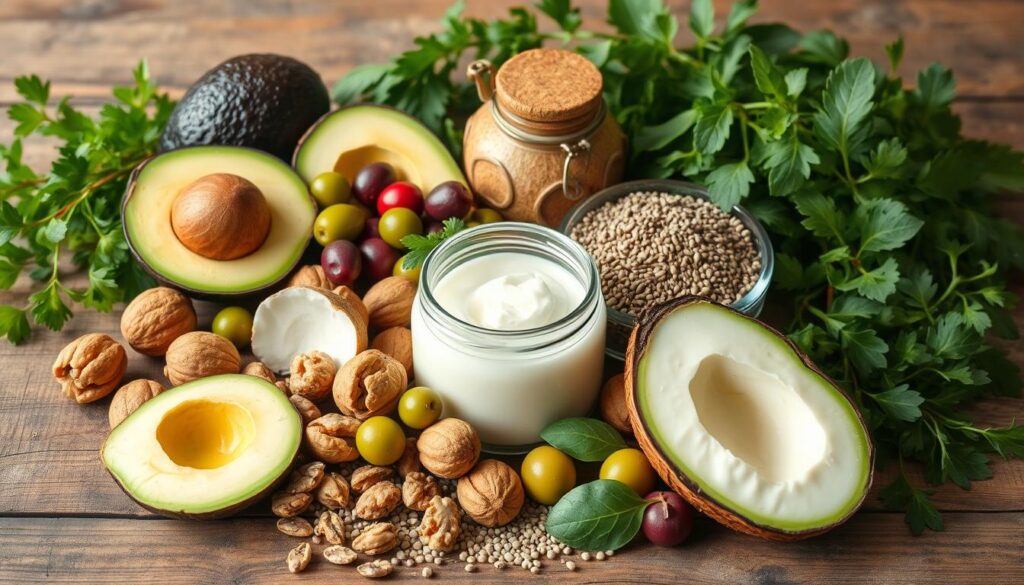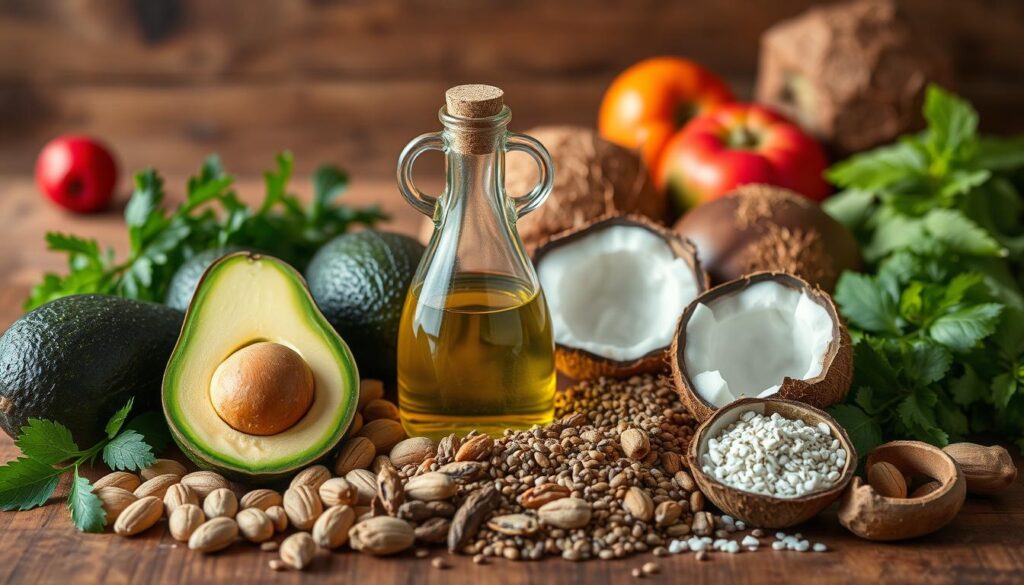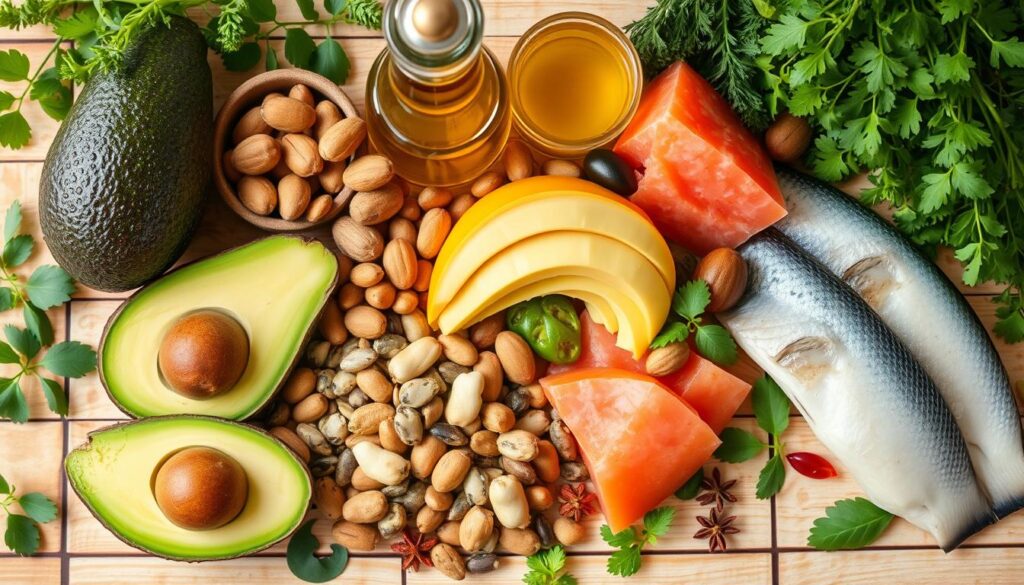Did you know not all fats are the same? Some types of healthy fats are key for our health. They help our heart and brain work better. But are you getting the most from monounsaturated fats, polyunsaturated fats, and omega-3 fatty acids in your meals? Let’s explore how these fats can boost our wellness.
Key Takeaways
- Healthy fats are essential for supporting heart health, brain function, and overall well-being.
- Monounsaturated and polyunsaturated fats, including omega-3 fatty acids, provide numerous benefits.
- Incorporating the right balance of healthy fats into your diet can make a significant difference in your overall health and wellness.
- Debunking common myths about fats and understanding their role in metabolism and body functions.
- Practical tips for selecting, storing, and cooking with nutrient-dense healthy fat sources.
Understanding the Role of Healthy Fats in Your Diet
Healthy fats are key to our health. Let’s explore how they help our bodies work well.
The Science Behind Fat Metabolism
Our bodies can break down different fats, like healthy fats. This includes monounsaturated fats and polyunsaturated fats. They turn into energy that powers us every day.
How Fats Support Body Functions
Healthy fats do more than just give us energy. They help us absorb vitamins, keep our hearts and brains healthy, and help with hormones. Eating the right fats can greatly improve our health.
Debunking Common Fat Myths
Many people still think all fats are bad. But, not all fats are harmful. Knowing the difference helps us choose better fats for our health.
“Fats are not the enemy. In fact, they are essential for our bodies to function properly.”

Accepting the importance of healthy fats is a big step towards better health. By understanding the science and clearing up myths, we can make better choices for our bodies.
The Different Types of Healthy Fats
It’s key to know about the different healthy fats we can eat. Let’s look at monounsaturated fats, polyunsaturated fats, and omega-3 fatty acids. Each has special benefits for our health.
Monounsaturated Fats: The Heart-Healthy Option
Monounsaturated fats are great for our hearts. They help keep cholesterol levels in check. You can find them in foods like avocados, olive oil, and nuts. Adding them to your meals can make your diet healthier.
Polyunsaturated Fats: The Multitaskers
Polyunsaturated fats are very helpful. They reduce inflammation and support brain and cell growth. You can get them from fatty fish, seeds, and some plant oils.
Omega-3 Fatty Acids: Nature’s Brain Boosters
Omega-3 fatty acids are known for their many benefits. They’re good for the heart and brain. You can find them in fatty fish, nuts, and seeds.
Knowing about each type of healthy fat helps us make better choices. Eating a mix of these fats can lead to a healthier lifestyle.

Essential Omega-3 Fatty Acids: Benefits and Sources
Omega-3 fatty acids are key to a healthy diet. They offer many benefits for our health. Let’s explore the science behind them and how to add them to our meals.
EPA and DHA Benefits
Eicosapentaenoic acid (EPA) and docosahexaenoic acid (DHA) are the top omega-3s. They help our heart, brain, and reduce inflammation. Eating more EPA and DHA can lower heart disease risk, improve brain function, and boost mood.
Plant vs Marine Sources
- Omega-3s are found in plants and sea creatures, but they differ in type and amount.
- Fatty fish and fish oil are rich in EPA and DHA, the best types.
- Chia seeds, flaxseeds, and walnuts have ALA, which our body can convert to EPA and DHA, but not as well.
Daily Recommended Intake
The daily omega-3 intake varies by age, gender, and health. Adults should aim for 1,100-1,600 mg of EPA and DHA daily. Eating foods rich in omega-3s helps meet this goal and supports our health.
Monounsaturated Fats: Heart-Healthy Champions
Monounsaturated fats are superheroes for a healthy heart. They support heart function and offer many benefits for our well-being. Let’s explore how these fats can be part of our daily lives.
These fats, found in avocados and olive oil, lower bad LDL cholesterol and raise good HDL cholesterol. This balance is key for a healthy heart and lowers heart disease risk. They also help control blood pressure and improve insulin sensitivity, crucial for heart health.
- Avocados are packed with monounsaturated fats, about 15 grams in a medium fruit. They’re great in salads, sandwiches, and even desserts.
- Olive oil, a key part of the Mediterranean diet, is also rich in these fats. Used in moderation, it adds flavor and heart health benefits to dishes.
Adding monounsaturated fats to your diet is easy and beneficial for your heart. Enjoying avocado salads or olive oil on veggies is a step towards a healthier heart.
Monounsaturated fats are the unsung heroes of the nutrition world, quietly working to improve our heart health and overall well-being.
So, include heart-healthy monounsaturated fats in your meals. Your body and heart will appreciate it!
Power-Packed Nuts and Seeds for Optimal Health
Nuts and seeds are tiny powerhouses of nutrition. They are full of healthy fats, fiber, and essential vitamins and minerals. These little gems can greatly improve our health and wellness. Let’s explore the top nutrient-dense options, learn about portion sizes, and discover storage tips to keep them fresh.
Top Nutrient-Dense Options
- Almonds: Rich in vitamin E, magnesium, and healthy fats.
- Walnuts: An excellent source of omega-3 fatty acids, helpful for brain health.
- Chia seeds: Loaded with fiber, protein, and antioxidants.
- Pumpkin seeds: High in zinc, magnesium, and plant-based omega-3s.
- Cashews: Creamy and delicious, providing copper and magnesium.
Portion Control Guidelines
When it comes to nuts and seeds, portion control is key. A serving size is typically around 1/4 cup or a small handful. It’s important to be mindful of your portions, as these nutritious snacks can be high in calories. Enjoy them as a healthy addition to your diet, but remember to practice moderation.
Storage Tips for Maximum Freshness
To keep your nuts and seeds at their peak, proper storage is essential. Store them in an airtight container in a cool, dry place, away from direct sunlight. The refrigerator or freezer can also help extend their shelf life. This will ensure you get the maximum nutritional benefits and flavor from these power-packed ingredients.
“Nuts and seeds are truly nature’s gift, packed with healthy fats, fiber, and a wealth of essential nutrients. Incorporating them into your diet is a simple way to upgrade your health and well-being.”
Avocados: Nature’s Perfect Fat Source
Avocados are a top choice for those who love healthy fats. These green fruits are full of monounsaturated fats. They’re perfect for anyone looking to eat well.
Avocados are loaded with monounsaturated fats that are good for your heart. They help lower bad cholesterol and increase good cholesterol. These fats also support brain function, hormone balance, and cell health. Plus, avocados have lots of vitamins, minerals, and antioxidants for overall wellness.
Avocados are super versatile in cooking. You can make guacamole or avocado toast. They’re great in both sweet and savory dishes. Plus, they make you feel full and happy because of their creamy texture and healthy fat content.
“Avocados are a true superfood – they’re packed with essential nutrients, healthy fats, and a host of other benefits that make them a must-have in any nutrition-focused kitchen.”
If you want to add more healthy fat to your diet, try avocados. They’re delicious and packed with nutrients. Enjoy the many benefits they offer.
Olive Oil: Mediterranean Wellness Secret
Olive oil, known as the liquid gold of the Mediterranean, is packed with healthy fats. It not only adds flavor to our meals but also boosts our wellness. Let’s dive into how to cook with olive oil and find the best quality for health.
Cooking Methods and Temperature Guidelines
Olive oil is great for many cooking methods. But, it’s key to know the right temperatures to keep its flavors and health benefits. Gently sautéing, roasting, or drizzling olive oil over dishes are great ways to enjoy its taste and health perks. But, avoid high heat to prevent losing its good stuff.
Quality Selection Tips
- Choose extra-virgin olive oil for its minimal processing and more natural goodness.
- Check the bottle for a harvest date to get fresher, better quality oil.
- Store olive oil in a dark, cool place to keep it fresh.
- Go for smaller bottles to use the oil before it loses quality.
Using high-quality olive oil in your cooking can bring Mediterranean wellness into your life. It’s full of monounsaturated fats and healthy fats, making every bite nourishing.
“Olive oil is the heart of the Mediterranean diet, and for good reason. Its mix of healthy fats, antioxidants, and flavor makes it key for a balanced, nutritious life.”
Coconut Oil: Tropical Superfood Benefits
Coconut oil has become a big hit in the health world! It’s a tropical superfood with many benefits. It can boost your metabolism and is great for cooking and beauty routines. Coconut oil is a top choice among healthy fats.
Coconut oil is special because of its fatty acids. It has medium-chain triglycerides (MCTs) that the body can use better than other fats. This might help with weight management.
Coconut oil is also good for fighting off germs, reducing inflammation, and protecting against damage. It’s a versatile ingredient for cooking, baking, and skincare. Its mild flavor and high smoke point are perfect for many recipes.
| Health Benefits of Coconut Oil | Culinary and Beauty Uses |
|---|---|
|
|
Looking to add coconut oil to your meals or beauty routine? It’s a great choice. Coconut oil brings healthy fats and wellness benefits into your life.
“Coconut oil is a versatile and nutritious superfood that can elevate both your cooking and your self-care routines.”
Smart Cooking Methods for Preserving Healthy Fats
When cooking with healthy fats, controlling the temperature is crucial. This helps keep the nutrients intact. Let’s explore smart cooking methods to enjoy our favorite healthy fats.
Temperature Control Techniques
Managing the temperature is key to keeping healthy fats intact. Here are some tips:
- Low and Slow Cooking: Use gentle methods like sautéing, baking, or roasting. This prevents healthy fats from breaking down.
- Avoid High Heat: Stay away from deep-frying. It can damage healthy fats and release harmful compounds.
- Gradual Heating: Warm healthy fats slowly before cooking. Avoid sudden, intense heat.
Best Kitchen Tools and Equipment
The right kitchen tools and equipment are important for preserving healthy fats. Here are some options:
- Heavy-Duty Pots and Pans: Choose high-quality cookware for even heat distribution. This prevents damage to healthy fats.
- Silicone Utensils: Use silicone spatulas, tongs, and whisks. They are gentle on healthy fats and won’t scratch surfaces.
- Slow Cookers and Air Fryers: These appliances cook at low temperatures. They’re great for keeping healthy fats intact.
| Cooking Method | Recommended Temperature | Healthy Fats Suitable |
|---|---|---|
| Sautéing | Medium-Low | Olive oil, avocado oil, coconut oil |
| Roasting | 400°F (204°C) or lower | Avocado oil, nut oils, ghee |
| Baking | 375°F (191°C) or lower | Butter, coconut oil, olive oil |
| Slow Cooking | Low to Medium | Tallow, lard, coconut oil |
By choosing the right cooking methods and equipment, we can preserve healthy fats. This unlocks their nutritional benefits and adds delicious flavors to our meals.
Meal Planning with Healthy Fats
Meal planning is a game-changer for adding healthy fats to our diets. By planning ahead, we can make sure these important nutrients are part of our daily meals. Here are some tips to help you use healthy fats in your meal planning.
Start with Breakfast
Breakfast is a great time to add healthy fats to our day. Try avocado toast, chia pudding with nuts and seeds, or a smoothie with nut butter and coconut milk. These choices will keep you full and energized all morning.
Incorporate Nuts and Seeds
- Sprinkle chopped nuts or seeds on top of salads, yogurt, or oatmeal for a satisfying crunch.
- Use nut or seed butters in sauces, dips, or as a spread on whole-grain toast.
- Snack on a handful of mixed nuts or seeds for a portable and nourishing option.
Embrace Healthy Fat-Rich Produce
Avocados, olives, and coconuts are great sources of healthy fats. Add them to your meals in creative ways. Try avocado on sandwiches, roasted brussels sprouts with olive oil, or coconut-based curries.
Plan Ahead with Meal Prep
Setting aside time for meal prep helps you add healthy fats to your meals. Cook in bulk with ingredients like salmon, nuts, or nut oils. Then, portion them out for quick, nutritious meals all week.
| Healthy Fat-Rich Ingredient | Meal Planning Ideas |
|---|---|
| Salmon | Baked salmon with roasted vegetables, salmon salad lettuce wraps, or salmon burgers |
| Olive Oil | Sautéed vegetables, roasted potatoes, or homemade salad dressings |
| Nuts and Seeds | Trail mixes, nut-based energy bites, or sprinkled on yogurt or oatmeal |
By adding healthy fats to your meal planning, you nourish your body and support your health. With a bit of creativity and planning, you can enjoy tasty, nutritious meals that keep you feeling great.
Using Food Scan Genius for Smart Fat Choices
Exploring healthy fats is now simpler with the Food Scan Genius app. This app helps us choose the right foods, ensuring we get the essential fatty acids we need.
Barcode Scanning Features
Just a tap on the button, and Food Scan Genius scans barcodes. It gives us quick access to nutritional info. This makes it easy to pick foods high in good fats for our meals.
Nutritional Analysis Tools
Food Scan Genius does more than scan barcodes. It also analyzes food nutrients, including fats and other important nutrients. This lets us make choices that fit our health goals, like more omega-3s or less bad fats.
FAQ
What are healthy fats, and why are they important for our overall wellness?
Healthy fats, like monounsaturated and polyunsaturated fats, are key for our health. They help our hearts, brains, and bodies work well. They give us the nutrients we need.
How do our bodies process and utilize healthy fats?
Our bodies use healthy fats in many ways. They help with energy and hormone balance. Knowing how they work helps us choose the right foods.
What are the different types of healthy fats, and what are their benefits?
There are monounsaturated, polyunsaturated fats, and omega-3s. Each type has special benefits. They help our hearts, reduce inflammation, and boost brain function.
What are the benefits of omega-3 fatty acids, and where can we find them?
Omega-3s, like EPA and DHA, are great for our hearts and brains. We can find them in fish and plants like chia seeds.
How can monounsaturated fats benefit our heart health?
Monounsaturated fats are good for our hearts. They lower bad cholesterol and reduce inflammation. Foods like avocados and olive oil are rich in them.
What are the top nutrient-dense nuts and seeds, and how can we incorporate them into our diet?
Nuts and seeds are full of healthy fats and nutrients. Almonds, walnuts, chia seeds, and flaxseeds are great choices. Enjoy them as snacks or add them to meals and baked goods.
Why are avocados considered a perfect source of healthy fats?
Avocados are full of monounsaturated fats. They’re creamy and versatile. Use them in salads, smoothies, and more.
How can we use olive oil to maximize its health benefits?
Olive oil is a healthy fat for our hearts. Use it wisely by choosing the right cooking methods and quality oil.
What are the unique benefits of coconut oil, and how can we incorporate it into our diet?
Coconut oil is a superfood with benefits for metabolism and cooking. Use it in baking and cooking to enjoy its health perks.
What are some smart cooking methods to preserve the nutritional value of healthy fats?
To keep healthy fats nutritious, use the right cooking techniques. Control temperatures and use the right tools. This way, we get the most from our food.
How can we incorporate healthy fats into our meal planning for optimal wellness?
Adding healthy fats to our meals boosts wellness. Find tasty ways to include them in breakfast, lunch, and dinner.
How can the Food Scan Genius app help us make smart choices when it comes to healthy fats?
The Food Scan Genius app helps find healthy fats in foods. Its barcode scanner and analysis tools guide us to make better food choices.






1 Comment
[…] the different winemaking methods that produce these pure, organic […]